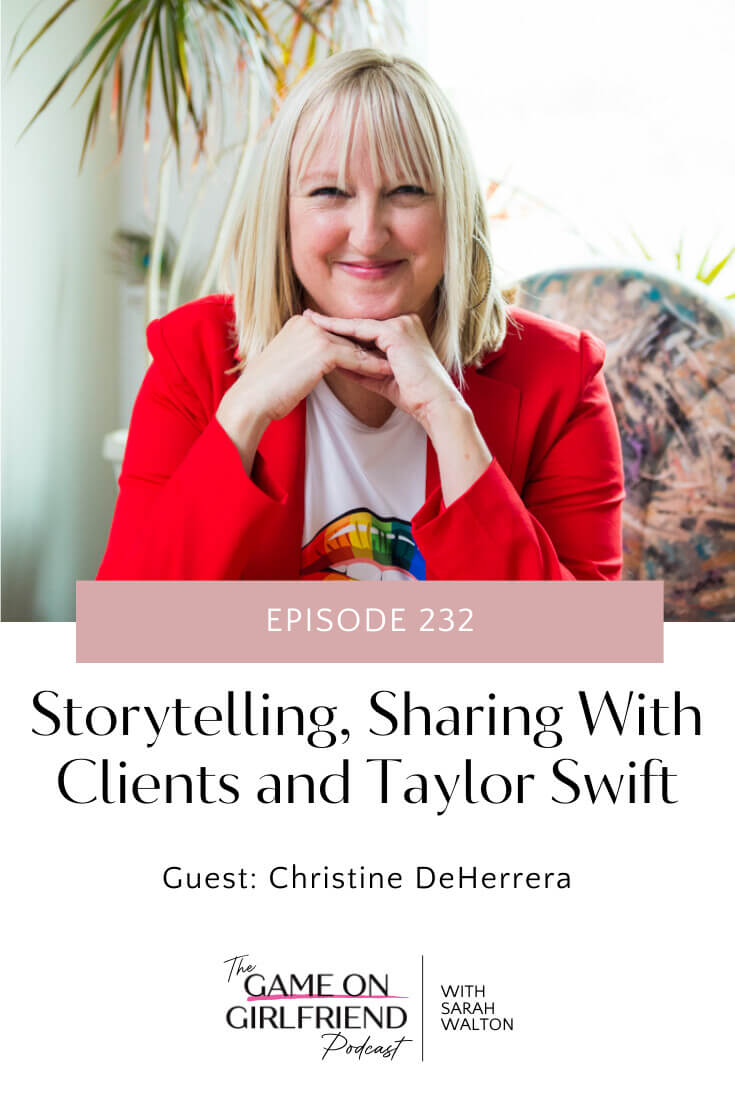Episode 232: Storytelling, Sharing With Clients and Taylor Swift with Christine DeHerrera

Have you been told that you need a brand story? Has somebody said to you, “You know if you don't have a story, your stuff will never sell.?” Given the success of some people, who are now billionaires because they tell stories very well (Taylor Swift), it seems like there's something to the power of storytelling.
Christine DeHerrera is a writer and business coach. As a publicist, she told stories for Olympic athletes, Fortune 200 individuals, experts, authors and business owners of every type for more than 20 years. Better storytelling helped them increase their sales, uplevel their collaborations and brand deals, grow their audience and increase their media presence. (She’s helped me with my grocery store story, too!)
Power of sharing your story
Christine says storytellers make the culture, but business owners don’t necessarily think about it. The more storytelling we can do, the more impact we can have. Part of that power is owning our stories and then changing the culture by changing the stories.
If you’ll let me have a fangirl moment right now, Taylor Swift is a billionaire of her own making because she sits down and writes stories. She can be your best friend, a maternal figure, or inspire and empower you with her lyrics. Whether you like her music or not, she’s tapped into the zeitgeist.
“As human beings, our brains are literally wired for story,” says Christine. “It's what differentiates humans from every other lifeform on the planet.”
Our brains are constantly scanning for information to keep us safe and information to keep us like moving ahead, because that's how we stay alive as human beings. Christine notes that Taylor Swift is not only great at meeting her listeners with her stories, but also, she has controlled her own narrative in a way that is pretty much unprecedented for a female artist.
That's what we have to do as business owners is: take control of our own narrative. Christine helps people with the stories we're telling on social media, the stories we're telling on our sales pages, the stories we're telling on podcasts. But she says she sees the whole picture, the whole business, from the lens of story. Our stories, our internal stories, are what make the external stories, she says.
Controlling the narrative
In controlling the narrative, it’s not necessarily victimhood. Using Swift as an example, she’s a great songwriter, but where the relatability comes in is with what she’s had to endure.
Everybody’s had a boss at some point who demanded things be done in a certain way and how they want it. That’s the music industry in general. Swift, and others, challenging that takes the journey of her own life and turns it into a hero’s story. So it’s not just a story of success, she’s relatable because she shares the struggle.
That's a really powerful lesson for business owners in that understanding day-to-day life--the things that we take for granted, the experiences that we have with our clients, with our customers--are also part of the story.
Obstacles to sharing stories
Christine says when she works with clients, most often they think their stories aren’t interesting. There's the idea that their story isn't big enough or that it's not interesting enough. Spoiler: We all get glued to reality TV and social media; other humans are inherently interesting to other people.
And the dips are what make us relatable to others.
“Your own journey is inherently interesting to your clients and to your viewers, your listeners, because they're going through something similar,” says Christine. “It's a little bit like your journey becomes your medicine.”
For others, the client might be too close to recognize their own stories. Then it's figuring out where to use the stories and when. The ones that apply to your customer, help them understand what journey they're on are always relevant, because in business, we're helping them transform in some way.
When you're working in your business, from your lived experience and the things that you've been through and you're sharing those, you attract your people. It feels really good to help them. Then they bring their people. That’s where you’ll start to see the jumps in your business.
When not to share the story
Christine says timing is important – especially now with social media. Sometimes you’ll get a warning about a vulnerable story coming through a post.
She says if you don't have a scar over that story, don't share it on social media. That's for your friends, your family, and your therapist until it doesn’t activate you. And not all scarred stories need to come out in your business.
People are under this intense pressure in general, living. An internal story a lot of business owners carry, especially if we're good girls, is “I've got to do it all. I've got to do it right. And I have to do it right now.”
Take the pressure off with social media. You don't owe them anything. You don’t need to share any of your experiences immediately.
Talking to your customers
Christine says sharing our customer stories with their permission is one of the best things you can do in your business because it allows your potential customers to see what that experience is like working with you. They are not only getting the result; they will have an entire experience.
Your customers’ stories are super critical to building and growing your business. It's that social proof we all talk about.
What you're looking to do in your business is to have other people telling their story, their excitement around whatever it is you do.
Free gift for listeners
Christine is sharing the Story Vault, a template she's used for years to capture story, and also a private podcast feed to teach you how to use and modify it. Click here for your free gift.
Binge More Game On Girlfriend™ Podcast Episodes
Something Just for You
Freedom in your business is here. Make revenue that allows you to exhale. Grab my free Freedom Calculator below, and know exactly how much your business needs to make so you can be FREE.




